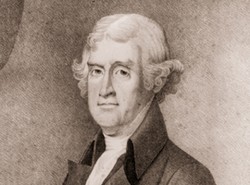Religion Of Thomas Jefferson
|
| updated |
Copy Link Code
|
 When investigating the religion of Thomas Jefferson, you will find an independence from any given ideology or denomination. Was Thomas Jefferson a Christian? Yes, but in a unique manner based on both Deist and Unitarian influence. Did Thomas Jefferson believe in God? Yes, and unlike most Deists, Jefferson did believe that God did play an active role in human events. For Thomas Jefferson, Deism was an important influence in thinking about religion in a new and more reasonable way. He treasured the philosophy and social teaching of Jesus Christ as much if not more than the records of miracles or doctrine of divinity. In the version of the Gospels edited by an aging Thomas Jefferson, Jesus plays the role of philosopher with almost all dogmatic references and miraculous events removed. Although they were promoted by such a prominent figure as Thomas Jefferson, Deist beliefs were still highly controversial at the time and he never published his secular edition of the Bible. In the experience of Thomas Jefferson, religious views were a personal matter that could be changed by scientific reason. Among the educated acquaintances of Thomas Jefferson, religious beliefs were shared and debated in privacy so as to avoid inflaming public opinion in the strongly Christian nation.
When investigating the religion of Thomas Jefferson, you will find an independence from any given ideology or denomination. Was Thomas Jefferson a Christian? Yes, but in a unique manner based on both Deist and Unitarian influence. Did Thomas Jefferson believe in God? Yes, and unlike most Deists, Jefferson did believe that God did play an active role in human events. For Thomas Jefferson, Deism was an important influence in thinking about religion in a new and more reasonable way. He treasured the philosophy and social teaching of Jesus Christ as much if not more than the records of miracles or doctrine of divinity. In the version of the Gospels edited by an aging Thomas Jefferson, Jesus plays the role of philosopher with almost all dogmatic references and miraculous events removed. Although they were promoted by such a prominent figure as Thomas Jefferson, Deist beliefs were still highly controversial at the time and he never published his secular edition of the Bible. In the experience of Thomas Jefferson, religious views were a personal matter that could be changed by scientific reason. Among the educated acquaintances of Thomas Jefferson, religious beliefs were shared and debated in privacy so as to avoid inflaming public opinion in the strongly Christian nation.
Thomas Jefferson and religion had a long and strange relationship. Although he was raised under the Church of England, the official church of Virginia at the time, Jefferson began his education at the College of William & Mary at the age of 16 and was immediately ensconced in the writing of European philosophers and theologians who promoted new theories on the role of religion and the nature of God. For the young Thomas Jefferson, beliefs about the divinity of Jesus Christ began to fade; throughout his life, Jefferson would reject the concept of the Holy Trinity and miracles that could not be explained through the laws of nature he observed. Jefferson would carry his independent beliefs into his political career, beginning in the Virginia House of Burgesses and culminating in his two terms as President of the United States. The difference between the views of Thomas Jefferson and Christianity as a whole were always dangerous politically; some of his opponents even claimed that Jefferson was not qualified to lead a Christian nation. But for an idealistic Founding Father such as Thomas Jefferson, religious freedom was a principle for all Americans to live by in harmony.
In one of the strongest stances taken by Thomas Jefferson, freedom of religion was considered a natural right. As Governor of Virginia, the proposal of Thomas Jefferson on freedom of religion became law. In 1786, the House of Burgesses approved "The Virginia Statute of Religious Freedom," preceding the U.S. Bill of Rights and most certainly born from the same Enlightenment influence. In 1802, it was President Jefferson who coined the term "separation of Church and State" in a letter to friend about the ideal form of government. Unfortunately, Jefferson's own unique religious views were made into a political whip and after his career in politics he learned to keep his conversations on religion among trusted friends.
